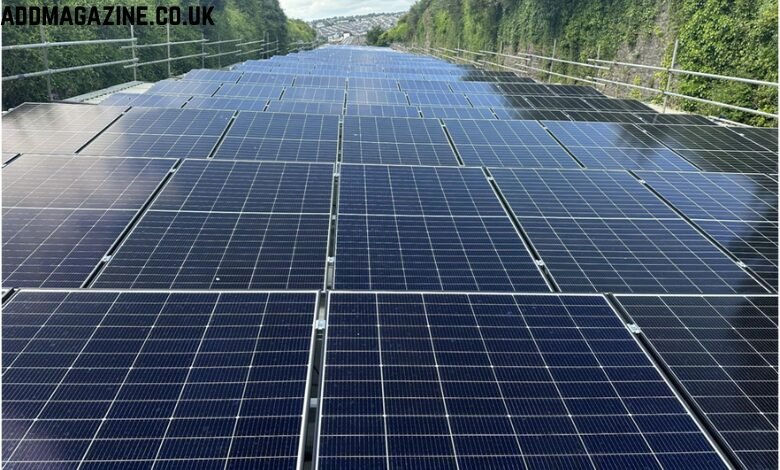If you’re asking whether solar works for businesses in the UK, yes, it does. A good solar energy company can install a system that slashes your electricity costs, earns money from the grid, and pays for itself in under ten years. That’s what a well-designed commercial solar installation UK can do.
Energy bills are squeezing UK businesses harder every year. Add in carbon targets, investor pressure, and the simple need to cut waste, and it’s no surprise that commercial solar panels are flying onto rooftops. From supermarkets to manufacturers, businesses are turning to solar panels for business to lock in savings and get ahead of future price hikes. But it’s not just about saving money. Having your own clean energy source means stability, it means less reliance on a grid that’s increasingly unpredictable. Whether your roof is in the Midlands or on the coast, a bespoke commercial solar installation lets you take control in a way that old energy contracts just can’t.
How Business Solar Actually Works
It’s pretty straightforward once you cut through the jargon. Your roof gets fitted with commercial solar panels, which absorb sunlight and turn it into electricity. Inverters convert that power to something your building can use. Any leftover energy can go back into the grid through the Smart Export Guarantee. A smart meter tracks how much you use, how much you export, and what you save. Systems are built to match your building, your hours of operation, and your electricity needs. A good commercial solar installer will figure out how to get you the best savings, not just fill your roof with panels. You don’t need to know every part name. But you do need a company that does.
Who You Work With Matters
There are loads of companies offering solar now, but not all of them are built for commercial work. A proper solar energy company will hold all the right certifications (MCS is a must), offer real site surveys, not just online estimates, and give you a clear idea of costs, timelines, and results. They’ll also support you long after the panels are up, with regular checks, performance tracking, and help when things need a tweak. Look for someone who’s installed for businesses like yours, not just residential customers. And if a quote looks too good to be true, it probably is.
What Installation Looks Like in the UK
If your building has a roof that’s strong, accessible, and not blocked by shadows, you’re probably a good fit for solar. Most installs fall under permitted development, so you won’t need planning permission unless your site is listed or in a sensitive location. The commercial solar installer handles all the technical stuff, grid connection, layout, structural checks, and system testing. And they should explain how they’re designing the system to match your usage. Here’s how the typical costs break down:
| Component | % of Total Cost |
| Panels | 25% – 40% |
| Inverters & controls | 10% – 20% |
| Mounting gear | 10% – 15% |
| Labour & fitting | 15% – 20% |
| Meters & cabling | 5% – 10% |
This will vary based on how large your roof is, how much energy you use, and what kind of access the site allows. The best installers will give you multiple options, with savings and ROI clearly laid out.
Available Grants and Financial Support
There’s a common myth that solar funding has dried up. While it’s true that large commercial solar panel grants aren’t what they used to be, there are still powerful incentives that cut costs. First, VAT on solar systems is currently set at 0%, which brings down the upfront bill by thousands. Second, the Smart Export Guarantee means you can get paid for power you don’t use, and the better your export tariff, the faster you reach payback. Third, through the Annual Investment Allowance, you can write off the full cost of the system against your profits, reducing your tax bill in year one. Some local councils also offer matched-funding or sustainability grants, especially for small businesses. A knowledgeable solar energy company will know what’s available in your region. For businesses that require specialized equipment, investing in a nitrogen generator alongside renewable energy solutions can enhance efficiency and sustainability in operations.
Is the Investment Really Worth It?
Short answer: yes, especially if your electricity usage is high and you operate during daylight hours. Let’s say your business uses 100,000 kWh per year. A 75kW system might generate around 65,000 kWh annually. If you use 60% of that and export the rest, and electricity costs you £0.15 per kWh, you could be saving nearly £6,000 a year, plus income from exports. Most systems pay themselves off in 6 to 9 years, and with panels often lasting 25 years or more, the long-term savings can be huge. The earlier you invest, the more you save over time, and the more stable your budget becomes.
What Could Get in the Way?
Not every site is ideal, and there are a few things to think about. If your roof isn’t structurally sound or has limited space, you might not get the scale you need. If your building is heavily shaded or only active at night, the savings may be smaller. Export caps in some regions can also limit what you earn from surplus power. Maintenance matters too, dirty panels or faulty parts can quietly reduce savings. This is why working with an experienced commercial solar installer is so important. They’ll spot problems early and give honest advice.
Why Excel Energy UK is a Solid Choice
We get it, choosing a solar energy company can feel like a gamble. That’s why Excel UK does things differently. We handle everything in-house. From your first chat with us to the day your system goes live, we stay hands-on. You’ll get a detailed quote, a design that suits your business needs, help with paperwork, and long-term support. We’ve worked with retailers, warehouses, logistics sites, farms, and more, all across the UK. We don’t do cookie-cutter installs. We do systems that work, and keep working.
Ready to Take the Next Step?
There’s no reason to wait while energy costs climb. Your roof is ready. Your business is ready. Let Excel Energy UK help you make the switch to commercial solar that delivers real results.




